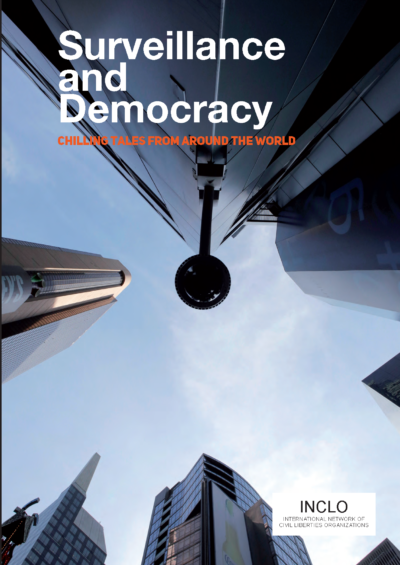AMIA: Appellate court confirms obstruction convictions in terrorist attack investigation
Joint statement with Memoria Activa following a ruling by judges Carlos Mahiques, Diego Barroetaveña, and Ángela Ledesma on April 11 regarding the cover-up.
The Court of Appeals of the City of Buenos Aires confirmed the unconstitutionality of the use of the Fugitive Facial Recognition System (SRFP) implemented by the Buenos Aires City Government
The ruling confirms what CELS and the Observatorio de Derecho Informático Argentino (ODIA) have denounced: the system was operated outside the law that regulates it and without oversight mechanisms.
UN universal periodic review: What is Argentina’s human rights situation?
Argentina will be reviewed in the United Nations Human Rights Council on Monday, January 23. It will have to report to its peers on compliance with its international commitments on human rights matters. CELS, along with other organizations, produced reports as prior contributions for the assessment and recommendations to be produced by this mechanism. We will also be present at the session in Geneva.
At the final hearing before the Inter-American Court for the AMIA bombing, the Argentine State acknowledged its responsibility
On October 13-14, the final hearing was held in Montevideo, Uruguay in the case filed by CELS and Memoria Activa in 1999 charging the Argentine State with international responsibility for the attack on the AMIA Jewish Community Center in Buenos Aires.
AMIA Bombing: Argentina Responsible For Impunity and HR Violations, IACHR
In its Merits Report, the Inter-American Human Rights Commission states that Argentina violated the right to life, to the personal integrity of the victims and their next of kin, the right to adequate judicial protection, and the right of society as a whole to the truth.
Dictatorship: Declassified US Intelligence
Together with Abuelas de Plaza de Mayo and Memoria Abierta, we created this tool to search, read and investigate the files recently declassified by US intelligence agencies.
AMIA attack: We ask that Argentina be held responsible and the case be sent to the Inter-American Court
On November 11, a pleading hearing in the AMIA case took place at the 174th session of the Inter-American Commission on Human Rights (IACHR), held in Quito, Ecuador. The participants in the hearing included Diana Wassner de Malamud and Adriana Reisfeld, from the Memoria Activa association of family members of AMIA victims, as well as … Continued
25 years without justice for the AMIA bombing
The scheming behind the AMIA case is still present and explains many of the problems that concern us today. The pacts between the judicial, political, intelligence and media sectors that built the impunity around the bombing have never been broken, nor have ways of doing things been transformed.
AMIA attack: Cover-up by the political establishment, the judge and prosecutors was proven
Today the trial over the AMIA attack that began on August 6, 2015 concluded. Former judge Galeano, former prosecutors Mullen and Barbaccia and the former secretary of intelligence Anzorreguy were among those convicted.
Privacy at risk: Telegram sanctioned in Russia for protecting its users
The Russian government fined Telegram and could block use of the instant messaging app, because the company refused to grant it access to users’ communications. Members of INCLO, including CELS, seek to curb such measures.
WTO meeting in Argentina: Rejected accreditations and deportations
The government rejected the accreditations of 65 people who planned to participate in the WTO Ministerial Conference in Buenos Aires and sent the list to immigration officials as a security “alert.” Two people on the list were ultimately deported.
WTO in Buenos Aires: Petitions for habeas corpus, habeas data and access to information
What information was gathered to decide which activists and organizations should be kept from participating in the WTO Ministerial Conference, and how was it collected? We present a set of habeas data petitions and a request for access to information.
Government must scrap decision to exclude civil society from the WTO Ministerial Conference
The Argentine government has revoked the accreditation of key civil society actors before the World Trade Organization. It attempted to justify this action by admitting it was based on an analysis of organizations’ social networks that aimed to exclude those considered “disruptive.” CELS and other organizations jointly submitted a letter requesting that this decision be rescinded.
What intelligence is being shared among countries?
The International Intelligence-Sharing Project was launched to demand that governments in eight countries tell the public what information-sharing agreements are in place with other nations. In Argentina, we filed an information request to the Federal Intelligence Agency (AFI).
Surveillance and Democracy: Chilling Tales from Around the World
Autor/a: Various
122 pgs.
ver más
After 21 Years of Impunity, Trial on Terrorist Attack Cover-up in Argentina Begins
After years of delays, officials from former Argentine President Carlos Menem on down will finally be tried for orchestrating a cover-up in the AMIA bombing investigation. Much is at stake for the victims, for Argentine society, and for its democratic institutions.



